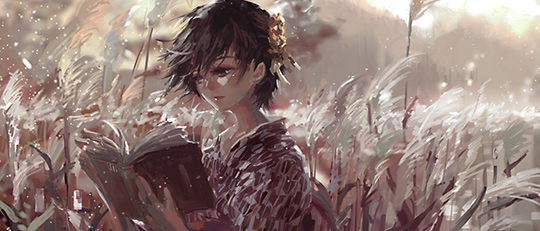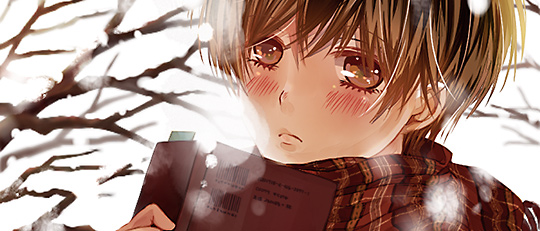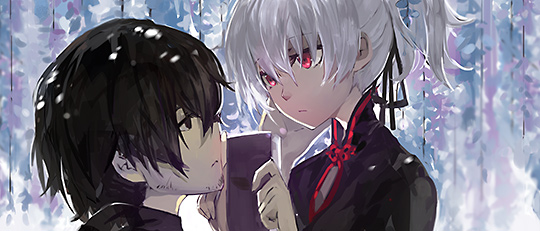Personally motivated posts really aren’t my forte, the reasons for which I won’t elaborate on because that would paradoxically make this post more personal. Regardless, introversion is a topic I take an active interest in primarily because I have been medically identified as introverted and I suppose my Meyers-Briggs INTJ classification would make me lean towards introspection as a pastime. I rarely talk or identify as introverted because doing so would put unconscious constrictions on my behaviour and because it naturally invokes thoughts in other people as to how I will act; neither situation I find favourable.
Watching Kawaisou recently though did make me think more about introversion in anime because the lead, Ritsu Kawai, shows a lot of the “classic” symptoms: seclusion, tiredness from social interactions, overthinking situations etc. I found it odd because I had never consciously “spotted” an introvert in anime before.
Perhaps because so many anime are set during schooltime which forcibly mixes very different people together and implies that one’s personality isn’t totally formed. More than likely though it’s for pragmatic reasons because one of the key traits of introversion is solitude (not to be confused with loneliness) which, exceptions like Kawaisou aside, doesn’t make for compelling drama. In the case of Kawaisou this is offset by the googly eyed male lead, Kazunari Usa through whom we experience the story.
What stuck out for me about it despite the obvious romantic overtones is that it deals with both sides of the introversion coin. An early story has Kazunari attempting to “press” Ritsu into opening up by barraging her with questions; he is eventually, and somewhat abruptly, shutdown making him think of Ritsu’s desires rather than just his own. A later story has Ritsu railroaded into going with her highschool peers to a karaoke “mixer”, an event she finds oppressive resulting in her eventually parting company with the friend by being honest with them about what she likes doing.
The former is Kazunari understanding that Ritsu doesn’t share his social norms whereas the latter is Ritsu clarifying what she does and doesn’t enjoy. The Kazunari/Ritsu setup is almost the direct inversion of the Hollywood favourite “manic pixie dream girl” plot that sees a high-on-life female drag a taciturn male out of his doldrums. There is an element of selfishness to Kawaisou’s story though in that Kazunari is the one making all of the effort to engage with Ritsu whereas she is largely shown as being very passive despite his obvious overtures.
That’s more a character fault though, if can even be called that given that Kazunari is demonstrated to be largely bereft of hobbies other than excessive exasperation with those around him. Nevertheless, it impressed me because of the sensitivity it showed to topics around introversion; even little things like Ritsu’s exasperation of “That tired me out!” after the aforementioned mixer or her rather more gregarious personality while tipsy. It did somewhat annoy me that it’s taken me over twenty years to figure all of this out and find friends who understand it equally rather than being sixteen and having it all fall in to place like some kind of-
Ahem. I digress. While researching, I began looking for more examples of introverts in anime, a quick Google search and what comes up are lists of characters who are arbitrarily labelled as introverts or a widely reported study that links introversion and talking about anime on social media. Those character lists makes for reading that is full of sighs: most characters people label as introverted are either shut-ins or contemptible cretins, neither of which does the term any favours. Common examples of the former are Tatsuhiro Satou from Welcome to the NHK or Jun Sakurada from Rozen Maiden both of whom are canonically hikkikomori yet both, when presented with the opportunity for social interaction embrace and revel in it (perhaps less so in Tatsuhiro’s case). This is ignoring the fact that being an otaku and a hikkikomori in anime are very frequently shown as one in the same, despite research to the contrary - check out “Shutting out the sun” by Michael Zielenzeiger for more on this.
For the latter, suggestions include Hei from Darker than Black or Houtarou Oreki from Hyouka. Houtarou is generally lazy, finding everything tiring rather than just social interaction though his traits aren’t wholly dismissible. Hei on the other hand is perhaps the hardest to disregard because although he spends a large amount of his time alone or with Yin, he plays the brooding (which is what handsome men do when pouting) asocial anti-hero rather than the quiet and thoughtful type.
The point I’m trying to make though is that Ritsu is the first character I’ve seen whose introversion isn’t treated as a social malady and doesn’t preclude her from having fun or socialising with others. Too often “introvert” is used as a synonym for shyness or, in the worst cases, for being anti-social. “Oh I’m not being an arse, I’m introverted, duh!”
The other part of that search though - the study on introverts talking about anime more - irked me, partly because of the “automatic” nature of the personality classification from language but also because it implicitly presumes that social media somehow obviates the standard introvert nature to recede. It doesn’t. It’s why the majority of my tweets are effective proclamations rather than actual interactions: just being online doesn’t remove the “social” aspect of social media.
Fundamentally though I’m brought back to my initial statement: that I don’t like self identifying as an introvert. Spending my time trying to classify the personality types of characters in anime, a somewhat fruitless exercise, is exactly what I wouldn’t like others to do with me. I may be introverted but I would rather not let that define me so it stands to reason that, where there is enough thought put into the characterisation, pigeon-holing them as introverted would be hypocritical. Ritsu is the first I’ve noticed perhaps because she is the most “canonical” and stands out because of it. It certainly was nice though to see a variation between social magnetism and reclusive shut-in that are so common amongst anime.
P.S. With a hat tip to one of the most well known articles on introversion for the title of this post



So to me, it's generally not a game of "spot the introvert"; it's more like looking at a person and thinking "introvert or extravert?" It's a sort of game, and nothing much rides on it, emotionally, for me. For example:
I find it highly plausible that Houreki from Hyouka is an introvert. He's not so much lazy, as I see him, as easily over-stimulated. We have a visual representation of that early on, where he looks at a notice board, and it's presented as some sort of swirling chaos (I'd have to re-watch the scene; I tend to misremember scenes). Basically, if I don't classify him as an introvert, I'd have to classify him as an extrovert, and that makes little sense to me.
Even in Kawaisou I'm pretty sure Ritsu isn't the only introvert. Shiro is almost certainly one, and I suspect that Sayaka, too, tends more towards introversion than extroversion. Mayumi and Kazunari are definite extraverts. I have no idea how to classify Sumiko.
Now, I, too, did a double take at Kawaisou's portrayal of introversion. Here I was watching what I thought was a fairly standard romcom, pretty and low-key, but really nothing special. And then they delivered that one episode (the "early story" in your post), and I'm thinking, wait, did this show just present me with one of the best portrayals of the problems that come with introversion?
I don't think pairing off introverts with extraverts is rare in romcoms: I'm thinking of Toradora's Ryuuji (introvert) and Taiga (extravert), or Tonari no Kaibutsu kun's Shizuku (introvert) and Haru (extravert). But usually romcoms don't hone in on the personality difference with such clarity; it's rather framed as romance plot elements (different needs for free-space, etc.).
I also don't really see Ritsu's passivity as a character flaw; rather I'd think it's an expression of their character dynamics. Kazunari sets the pace, which leaves Ritsu with no choices other than to adapt or to stop him short. Basically, when it comes to relationships, a little goes a long way for an introvert, but a little is little more than a teaser for an extravert. This almost always ensures that the extravert is the active part in a relationship, just because s/he'll have the need for contact first. I think Kawaisou did an outstanding job balancing these needs without making a fuss.
That's an interesting TED talk. I'll watch it when I have the time.